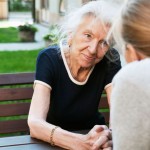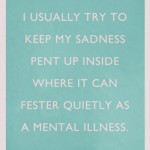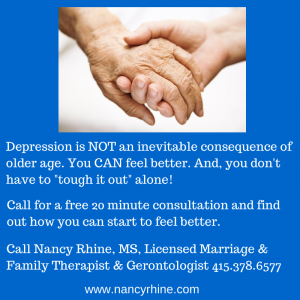Mental Health & Aging
Depression is NOT inevitable in older life.
 Our youth-oriented Western culture seems to tell us that we are all doomed to succumb to debilitating depression as an inevitable part of growing older. This is not true!
Our youth-oriented Western culture seems to tell us that we are all doomed to succumb to debilitating depression as an inevitable part of growing older. This is not true!
Sure, it is true that getting old “ain’t for sissies” as Bette  Davis famously put it. There are a myriad of challenges that confront us. Nobody would argue that! We know what those challenges are – all kinds of changes, losses of various sorts from little things to profound ones, aches and pains, the gamut.
Davis famously put it. There are a myriad of challenges that confront us. Nobody would argue that! We know what those challenges are – all kinds of changes, losses of various sorts from little things to profound ones, aches and pains, the gamut.
But, you can also thrive in later years. It’s about your mindset, your emotional and spiritual practices and your strong support network. The kids called support networks these days, their “posse”. Your posse can be made up of old and new friends, your peers, support group members, family, pets, counselors, trusted doctors and spiritual advisors.
Generally, people like you have an assortment of healthy, tried-and-true coping skills that have gotten you this far in your life. Perhaps now, however, you are encountering an accumulation of situations that tax those skills. It may be time to remember your old skills and to learn new ones. It may likely be time as well to rethink your life’s purpose. Purpose is key to keeping your mood up and your heart content.
What stands in the way? Well, too many times, that old Shame rears its head and tells you that you ought to be able to figure this out on your own, that you ought to be able to just “tough it out” and do it alone or else you’re weak. You can’t burden your children so what to do? As the blue box here says, don’t keep it bottled up inside!
What people often don’t realize is that you are not alone in feeling challenged, stressed, confused, overwhelmed or anxious. These feelings surface when we are going through new phases and transitions in our lives. It’s during these times that it becomes so important to realize you don’t have to reinvent the wheel. There are many practices and tips for how to increase your enjoyment of life in older years.
The important thing is to not give up and figure that just depression goes with the territory. That may be what society tells you, it might be the prevailing attitude. But it is not true. Reach out for help. Counseling and support can turn your life around and help you reclaim your confidence, solid footing and peace of mind. Isn’t it worth a try? What have you got to lose!
Depression & Anxiety Are Not Signs of Weakness

Volunteering as Older Adults – Why Is It a Good Idea and Where Can I Help?
Volunteering is good for our health.
Regular reports in local newspapers and publications extol the great contributions of Marin’s many individuals who generously volunteer their time and leadership skills to help local organizations.
A report published by the Marin Community Foundation entitled “Volunteering by Older Adults in Marin County: the Impact on Volunteers and the Organizations They Serve”, read:
“Older adult volunteers represent a significant resource that nonprofits can leverage during a time ofdecreased funding and increased demandfor services. Marin County’s growing population of older adults is rising to meet this increase in demand for volunteers.”
What may be less known, however, is how beneficial the practice of volunteerism is to the health and wellbeing of the volunteers themselves.
According to the MCF report, the following are some of the major benefits to older adults of serving as volunteers in their communities:
1. Enhanced sense of purpose and self-worth. Contributing wisdom and know-how based on past careers, special interests, experience and life lessons leaves volunteers with a sense of satisfaction and of being valued.
2. Improved mental and physical health. Over half of older adult volunteers report that volunteering contributes moderately or significantly to their physical health, helps them feel significantly better emotionally and “keeps their minds sharp.”
3. Increased confidence in one’s ability to make a difference in the community. Older adult volunteers emphasize how fulfilling it is to use their time, skills and experience to make differences in their communities.
4. Greater social support and community involvement. Volunteering helps most people feel more connected to their communities.
5. Exposure to new experiences and perspectives. Meeting new people, sharing skills, and hearing life stories leads to changing perspectives about community groups and issues.
6. Increased connection to younger generation. Older volunteers emphasize how energizing and valuable it is to spend time helping out younger people and feel that they are making a positive difference in these young folks’ lives.
Where Can I Go To Volunteer My Help?
This is easy to find out in Marin. We are fortunate to have Volunteer Marin, a program of Marin’s Center for Volunteer and Nonprofit Leadership. Founded in 1965 as the Volunteer Bureau, the Center has been building the capacity of volunteers and nonprofits for over 40 years.
If you are Internet savvy, it is simple to log in to a very cool tool: www.VolunteerMarin.org. Once on their home page, click on “Opportunities”. You will see a calendar of all kinds of opportunities, organizations, locations, dates and times that way.
You can also do wonderfully fruitful, customized searches by specifying your specifics and preferences, such as:
- your location, and how far you might be willing to travel
- your weekly schedule; what dates you are and are not available
- what kinds of things you would like to do, for instance:
-
- work with a particular organization
- address a specific issue area, like arts, education, health, hunger, environment, or justice.
- apply your special skills such as administrative, counseling, animal services, education, or construction.
- specify what kinds of people you’d like to serve, such as age, gender, ethnic group, LGBT, veterans, families, or visitors.
- select types of activity
- choose upcoming events that need volunteers
-
I tried out the Volunteer Search Tool and entered a stipulation that volunteer opportunities be within 10 miles of my home in Mill Valley. Up came 120 different interesting opportunities for volunteering at great organizations, including:
- The Redwoods
- The Audubon Center & Sanctuary
- The Marine Mammal Center
- Project Coyote
- Hospice By The Bay
- Marin History Museum
- Fair Housing
- Marin Art & Garden Center
- Marin School Garden Network
- The Bay Model
- The Civic Center
- and more
Doing things like…
- tutoring kids
- serving as a tour guide or docent
- taking care of injured animals
- coordinating cultural and entertainment events
- visiting the dying
- serving hot meals to the homeless
- designing web site and marketing materials
- doing historical research
- reading stories to children
- managing a website
- leading arts groups
- working with autistic children
- and so much more
For those of you who are unable to access Volunteer Marin online, you can contact them on the telephone through their parent organization, the Center for Nonprofit and Volunteer Leadership at415-479-5710.
In this time of decreasing funding for excellent causes, and increased need by our fellow citizens, consider helping out and doing yourselves a favor, too. Try becoming a volunteer.
It’s Vital to Recognize Depression in Aging Adults
This is a very good, short article on why it is so important to recognize the signs and symptoms of depression in older people. They may not recognize that they themselves are depressed so it is imperative for caregivers and loved ones to be on the lookout. Undiagnosed depression can lead to isolation and even suicidality. Most cases of depression can be cured. This article is written by an older gentleman who has over 30 years experience working in retirement community and health facility administration. He includes reminders and tips for fighting depression in this article. Recognize Depression in Older People – You May Save A Life
Fall Prevention
Fall Prevention. Falls are a high priority concern for middle age and older people since they are at increased risk for bone fractures and other fall-related injuries. Using a cane or eventually a walker helps many individuals to be steadier and more confident while walking. Some of the reasons, clients cite for falling are: tripping on something, their legs just “giving out”, and feeling dizzy. One often overlooked cause of unsteadiness and lightheadedness is dehydration. As we age, our sense of thirst tends to decrease – so it is important that we consciously make sure to drink plenty of water every day. An easy way to help fight the dehydration that can occur over the course of the night is to keep a glass of water on your night stand. When you wake up, sit up and drink the water before getting out of bed. Also, squeezing your calves and circling your ankles *before you get out of bed* will help increase your lower body circulation and make you feel steadier when you do get up and on your feet. For more fall prevention tips, check out http://www.mayoclinic.com/health/fall-prevention/HQ00657 .
Ageism and Mental Health Funding
Something I have run into in our society is a seemingly widespread belief that mental health services are primarily for younger people and not older individuals. I have heard people say that older people have had their chances and that mental dianabolos 10 health funding should go to young people where it can make a bigger difference. While I love young people, and think that kids need and deserve a lot of support, I also am saddened to think that there is a bias towards older people not getting mental health help.
This attitude seems to reflect our youth-oriented culture which emphasizes staying young in order to be important. Where is the care and compassion and respect due to our elders? The aging journey very often brings up old fears, old triggers of insecurity, old pains, old losses even from childhood. Why should older individuals – who have given to their communities all of their lives – not benefit from compassionate support as they continue their life journeys? Where is our culture’s realization that we need to hear the stories our older folks can tell us in order to gain from their wisdom and experience?
It seems to me as I grow older that I see our society having a shorter and shorter collective memory. After one year is over, we tend to go on and focus on immediate problems and immediate gains, forgetting the lessons we might have learned from what happened earlier.
While our country’s economy has been severely impacted in recent years, it has been enormously helpful to me to listen to elders’ tips about how they got through the trying years of the Great Depression and WWII. As Joan Erikson explained once, “wisdom” is not necessarily about knowing “why” but about knowing “how”.
I hope that a fair portion of mental health funding allocated by government at different levels will go to mental health services for older people. It behooves us to take care of our elders, to listen to their stories and to afford them the respect they deserve. They are survivors. We need them. We can learn things from them!
